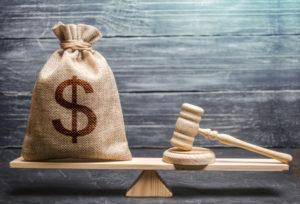
Compensatory damages make up most of the recoverable damages after a personal injury accident. They cover the actual expenses and losses the accident victim suffered due to the accident and their injuries.
The at-fault party whose negligence caused you harm is generally responsible for paying your compensatory damages following an accident. An insurance settlement may allow you to avoid a lawsuit when seeking this compensation if they have the required liability policy.
Compensatory Damages Include Your Economic Expenses and Losses
Victims can often recover compensation for the financial harm they suffered in an accident. This includes the documented value of their bills and more. Examples include:
Expenses to Date
It may be possible to recover compensation for the money paid or owed through the date of your claim, such as:
- Medical bills
- Vehicle repairs or other property damages
- Rental car costs
- Related expenses with receipts
Income Losses
Losses generally refer to the wages victims missed while they were away from work because of their injuries. This category of damages could include:
- Missed wages, tips, and other income
- Benefits lost
- Diminished earning ability if they cannot return to their previous position
Future Expenses
A personal injury payout could also include compensation for the victim’s future needs as estimated by experts. This most commonly centers on future necessary medical treatment and support costs.
For a free legal consultation, call (800) 537-8185
You Can Also Recover Compensation for Your Intangible Losses
Compensatory damages can also include non-economic losses. These are the intangible damages victims experience because of an accident. Despite not having a direct financial value, they may comprise a large portion of a settlement or court award.
An attorney from our firm knows how to put a fair value on these damages based on their experience and access to tools, such as the calculators and computer programs that insurers use. Some recoverable non-economic losses include:
- Pain and suffering
- Reduced quality of life
- Loss of enjoyment of life
- Emotional distress
How Can I Document My Compensatory Damages and Prove Their Value?
To recover compensatory damages, personal injury victims need to gather evidence to show their claim’s value. This evidence often includes a wide range of paperwork, expert opinions – such as those from an accident reconstruction specialist or medical professional – and other proof of how much the incident and their injuries cost them. Other examples of evidence include:
- Medical bills
- Documents showing missed work and lost wages
- Car repair estimates
- Receipts for accident-related expenses, such as receipts for parking at the doctor’s office
- Relevant medical records showing disability and ongoing care
- Expert testimony about future treatment and care needs
- Testimony from industry experts who can speak to the victim’s future ability to earn
- Documentation of activities the victim enjoyed but can no longer do without assistance or at all
- A journal or other proof of pain and disability
A Lawyer Can Determine How Much Your Case Is Worth
If you hire a personal injury attorney from our team, they will ensure they have documentation of your expenses and losses as a part of developing the case for compensation. They will work with you to obtain this evidence and use it to put a fair settlement value on your case. This will help you determine if a settlement offer is appropriate or too low.
Click to contact our personal injury lawyers today
Are There Non-Compensatory Damages?
In some cases, non-compensatory damages may be recoverable in a personal injury case. This is relatively rare, however. The primary source of any non-compensatory financial recovery is punitive damages. Punitive damages penalize the at-fault party.
Courts generally only award punitive damages when the defendant acted in a way that was intentional, willful, malicious, wanton, or vindictive. For this reason, most car accident cases, slip and falls, and other types of personal injury cases do not support the recovery of these non-compensatory damages.
How Can an Attorney Help Me Seek Compensation for My Damages?
Our personal injury legal firm may be able to help you with your insurance claim or civil lawsuit in several ways. Our services include:
- Protecting your rights
- Managing communications about the case
- Investigating the accident and developing support for your claim
- Preparing and filing the claim
- Negotiating with the insurance company adjuster or liable party
- Filing suit and representing you at trial, if need be
Our team provides free case reviews for potential clients, and our attorneys work based on contingency fees. This fee structure means you own no attorneys fees unless and until we deliver a settlement or court award in your case.
Deadlines Apply in the Personal Injury Lawsuits
There are time limits for suing the liable party. In the Gulf South, this could include:
- Up to one year from the injury date in Louisiana (La. Civ. Code Art. 3492)
- Up to two years to sue in Alabama (Ala. Code § 6-2-38)
- Up to three years to file in Arkansas (Ark. Code Ann. § 16-56-105) and Mississippi (Miss. Code Ann. § 15-1-49)
Some circumstances could reduce the time you have to begin a lawsuit, as well. Calling our firm as soon as your injuries allow can help us stay ahead of the filing deadline in your case.
Speak with a Lawyer from Morris Bart, LLC, for Free Today
The Morris Bart law firm provides free case reviews from one of our 15 offices in the Gulf South. Call (800) 537-8185 to learn more about how a lawyer with our firm can help with your case during a free consultation.
Questions?Call (800) 537-8185
to find a Morris Bart office near you.





